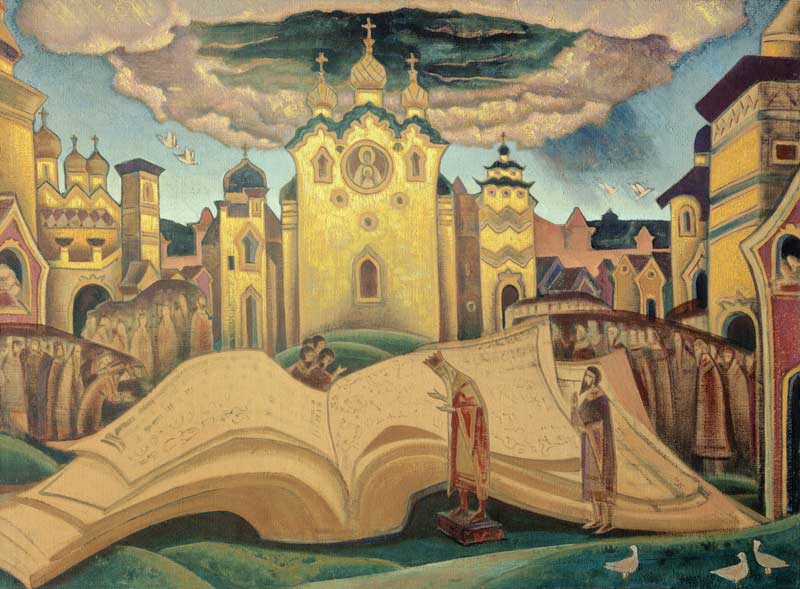Dove Book on:
[Wikipedia]
[Google]
[Amazon]
 ''The Verse About the Book of the Dove'' or ''Dove Book'' () is a medieval . At least 20 versions are known. They vary in length from 30 to over 900 lines. The poem is generally thought to have been written in the
''The Verse About the Book of the Dove'' or ''Dove Book'' () is a medieval . At least 20 versions are known. They vary in length from 30 to over 900 lines. The poem is generally thought to have been written in the
Two versions of the poem
(in Russian) Apocrypha Christian poetry Folk Christianity 15th-century Russian literature Riddles
 ''The Verse About the Book of the Dove'' or ''Dove Book'' () is a medieval . At least 20 versions are known. They vary in length from 30 to over 900 lines. The poem is generally thought to have been written in the
''The Verse About the Book of the Dove'' or ''Dove Book'' () is a medieval . At least 20 versions are known. They vary in length from 30 to over 900 lines. The poem is generally thought to have been written in the Novgorod
Veliky Novgorod ( ; , ; ), also known simply as Novgorod (), is the largest city and administrative centre of Novgorod Oblast, Russia. It is one of the oldest cities in Russia, being first mentioned in the 9th century. The city lies along the V ...
region, though Russian nationalists postulate its great antiquity. The earliest extant manuscript is dated to the 17th century.
The main part of the ''Dove Book'' is a long sequence of riddle
A riddle is a :wikt:statement, statement, question, or phrase having a double or veiled meaning, put forth as a puzzle to be solved. Riddles are of two types: ''enigmas'', which are problems generally expressed in metaphorical or Allegory, alleg ...
s. In a series of answers to those riddles, King David
David (; , "beloved one") was a king of ancient Israel and Judah and the third king of the United Monarchy, according to the Hebrew Bible and Old Testament.
The Tel Dan stele, an Aramaic-inscribed stone erected by a king of Aram-Damas ...
explains the origin of light, sun, moon, and social classes. He also mentions a mysterious stone "clept the Alatyr". Isabel Florence Hapgood
Isabel Florence Hapgood (November 21, 1850 – June 26, 1928) was an American ecumenist, writer, and translator, especially of Russian and French texts.
Early life
Hapgood was born in Boston, to Asa Hapgood and Lydia Anna Bronson Crossl ...
describes the content of one version in the following terms:
The poem's folk cosmology
Cosmology () is a branch of physics and metaphysics dealing with the nature of the universe, the cosmos. The term ''cosmology'' was first used in English in 1656 in Thomas Blount's ''Glossographia'', with the meaning of "a speaking of the wo ...
and the title have been derived by Vladimir Toporov
Vladimir Nikolayevich Toporov (; 5 July 1928 in Moscow5 December 2005 in Moscow) was a Russian philologist associated with the Tartu–Moscow Semiotic School. His wife was Tatyana Elizarenkova. He is also recognized as a prominent Balticist. ...
from the ''Bundahishn
The ''Bundahishn'' (Middle Persian: , "Primal Creation") is an encyclopedic collection of beliefs about Zoroastrian cosmology written in the Book Pahlavi script. The original name of the work is not known. It is one of the most important extant ...
''. The root "golub" (dove) in title "Golubinaya" is not about birds. It is believed to be derived from the root "glub" (depth, deep), which refers to depth of concepts described in the book. Also it could originate from "sefer torah": truncated "sefer tor" can be translated to Russian as "dove book".
Several major Russian poets and artists of the early 20th century (such as Nicholas Roerich
Nikolai Konstantinovich Rerikh (), better known as Nicholas Roerich (; October 9, 1874 – December 13, 1947), was a Russian painter, writer, archaeologist, theosophist, philosopher, and public figure. In his youth he was influenced by Russ ...
and Andrey Bely
Boris Nikolaevich Bugaev (, ; – 8 January 1934), better known by the pen name Andrei Bely or Biely, was a Russian novelist, Symbolist poet, theorist and literary critic. He was a committed anthroposophist and follower of Rudolf Steiner. His ...
) were inspired by the ''Dove Book''. The Russian Orthodox Church
The Russian Orthodox Church (ROC; ;), also officially known as the Moscow Patriarchate (), is an autocephaly, autocephalous Eastern Orthodox Church, Eastern Orthodox Christian church. It has 194 dioceses inside Russia. The Primate (bishop), p ...
had it banned as a heretical mixture of apocryphal Christian tales with pagan lore.
References
{{reflistExternal links
Two versions of the poem
(in Russian) Apocrypha Christian poetry Folk Christianity 15th-century Russian literature Riddles